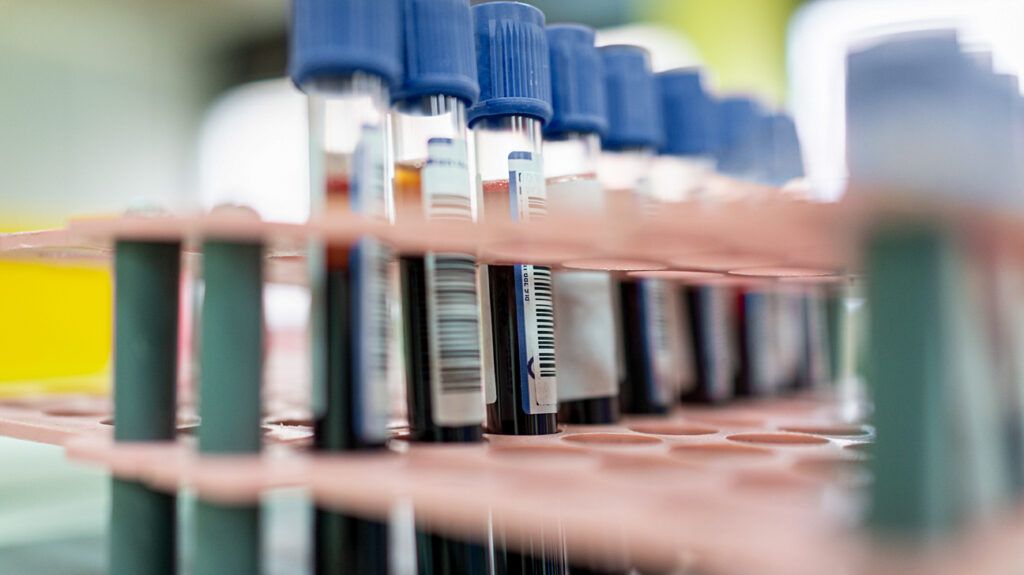Blood tests are emerging as a tool for healthcare professionals to diagnose mental health disorders more accurately. But more research is needed before they become standard.

Mental health conditions are often diagnosed by mental health professionals, such as psychiatrists, psychologists, and other clinicians. But a professional diagnosis of mental health disorders leaves room for error.
This is often due to overlapping symptoms across different mental health disorders.
But new research is focusing on providing more accurate diagnoses. What if there was a better way to ensure patients receive correct diagnoses? Blood tests may be that avenue.
Blood tests have been evolving to detect, treat, and prevent specific illnesses, especially mental health disorders. Research is still progressing on this diagnosis and treatment method, but it looks promising as a direction for diagnosing mental health disorders.
Blood tests are growing as a method of detecting mental health conditions.
For example, a 2016 study identified biomarkers for bipolar disorder using blood tests with about a 70% accuracy rate.
Researchers were also able to find 20 biomarkers that could distinguish between those with bipolar disorder and a control group.
Also, the study research suggests that individuals with bipolar disorder could receive an incorrect diagnosis because it overlaps with the symptoms of psychosis in schizophrenia and many other disorders symptoms.
The result points to a need for a biomarker panel specifically for bipolar disorder.
Other conditions folks with bipolar disorder are often misdiagnosed for include:
- major depressive disorder (MDD)
- narcissistic personality disorder
- attention deficit hyperactivity disorder (ADHD)
- borderline personality disorder
- generalized anxiety disorder
A
Although the test isn’t yet common practice, it could eventually be a way to diagnose mental health disorders more accurately.
What is a blood biomarker? What does it reveal?
Blood biomarkers are molecules that can indicate a disease or a medical condition. Biomarker patterns and groupings are studied to help healthcare professionals diagnose diseases and conditions accurately.
For example, biomarkers would show similar groups of molecules in a blood test that’s standard among individuals with a specific condition.
Biomarkers can also help determine your body’s responseto medications and the appropriate dosage. Also, blood biomarkers could reduce the time it takes to determine the appropriate medication for people with bipolar disorder.
Bipolar disorder is prevalent in about
For a doctor to diagnose bipolar disorder, you have to have at least one episode of mania or hypomania.
Individuals with bipolar disorder can also experience depressive episodes. The depressive states present in bipolar disorder may be difficult to distinguish from MDD.
Also, the manic states in bipolar disorder may be challenging to differentiate from schizophrenia.
There isn’t a blood test for routine clinical use. But areas for further research on a standardized clinical blood test to help health professionals diagnose and treat bipolar disorder are promising.
Personalized matching with medication
Researchers in a
Their study suggested which medications may be helpful for the participants based on their symptoms and their biomarkers.
For example, the study used a patient profile identified in the research and showed the biomarkers in her profile.
She scored high for depression and had an increased possibility of bipolar mood shifts (which authors called “switching”). Researchers could decide which medications might be most useful for her specifically.
Before the study, the participant had been incorrectly diagnosed with MDD, which usually is treated with antidepressants. But based on her blood biomarker panel, antipsychotic medications and mood stabilizers were determined to be more useful.
More research is needed on the personalized matching of medications, which could reduce the trial and error time of psychiatric medications used in bipolar disorder.
There isn’t a standardized clinical blood biomarker testyet to determine bipolar disorder or provide personalized medication matching.
But emerging research is promising in developing blood biomarker tests to help healthcare professionals diagnose and treat bipolar disorder.
The benefits of blood biomarker tests would help individuals with bipolar disorder receive better-matched medications to alleviate symptoms.
In addition, blood biomarker tests may help cut down on misdiagnosis and help distinguish between bipolar disorder and other conditions with overlapping symptoms.
